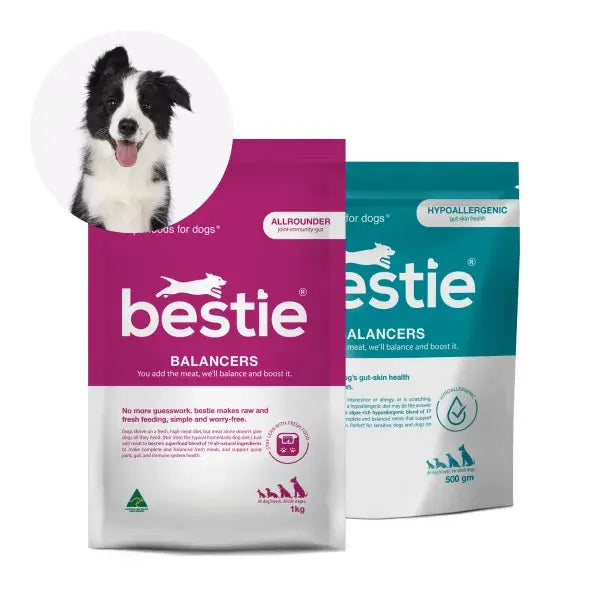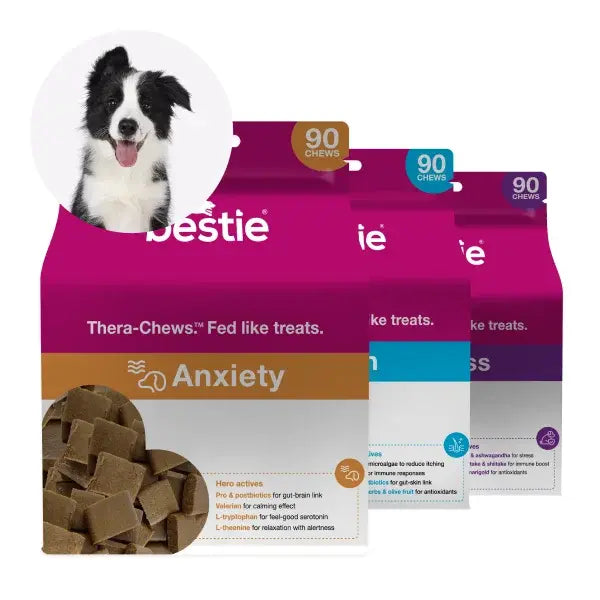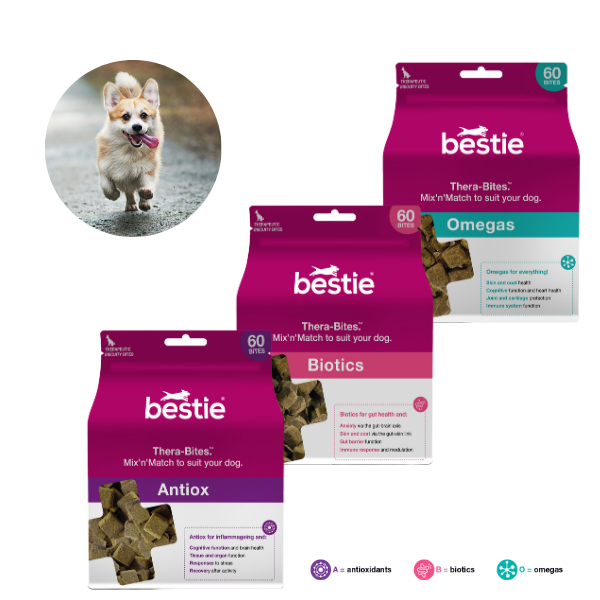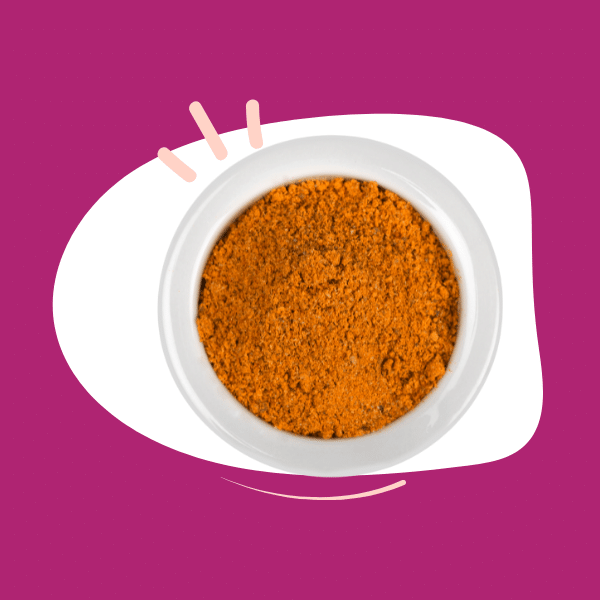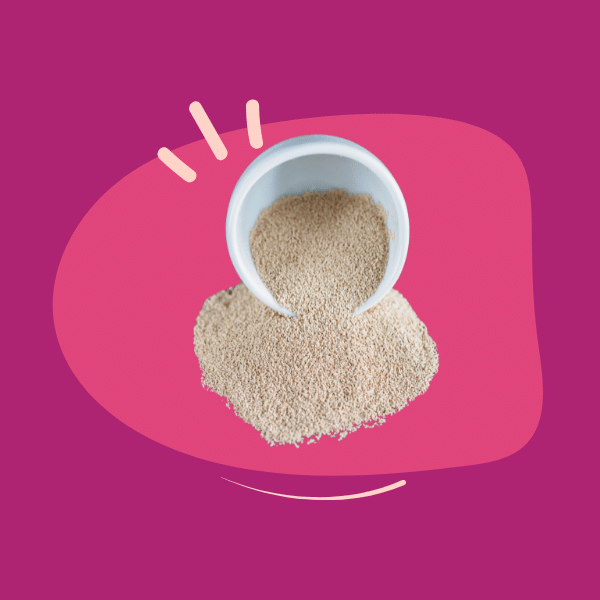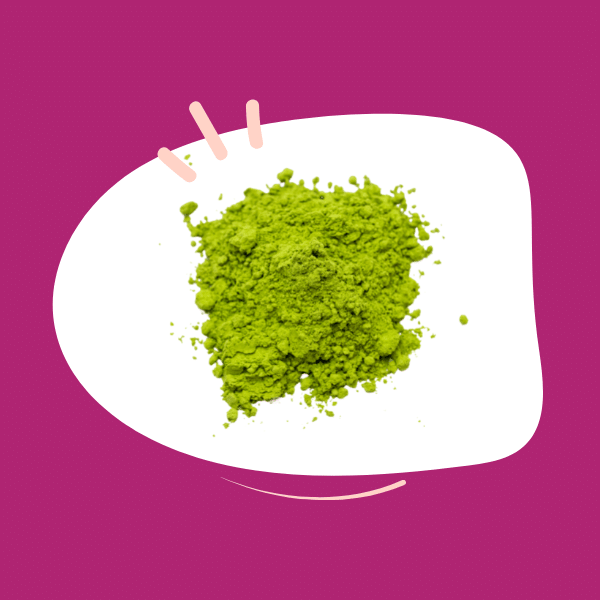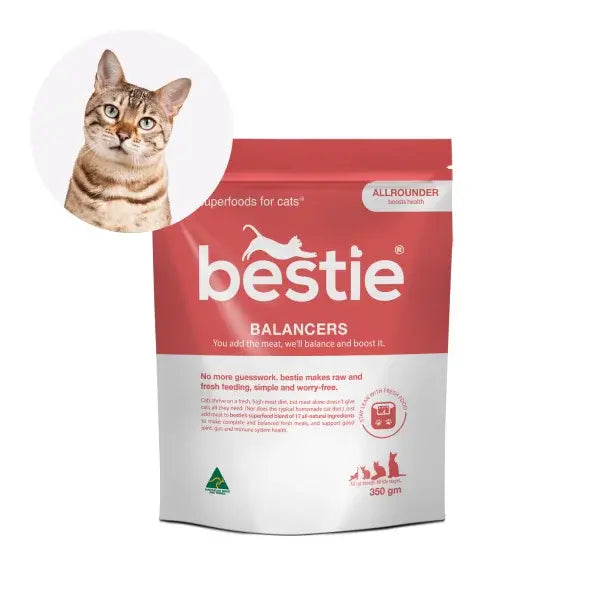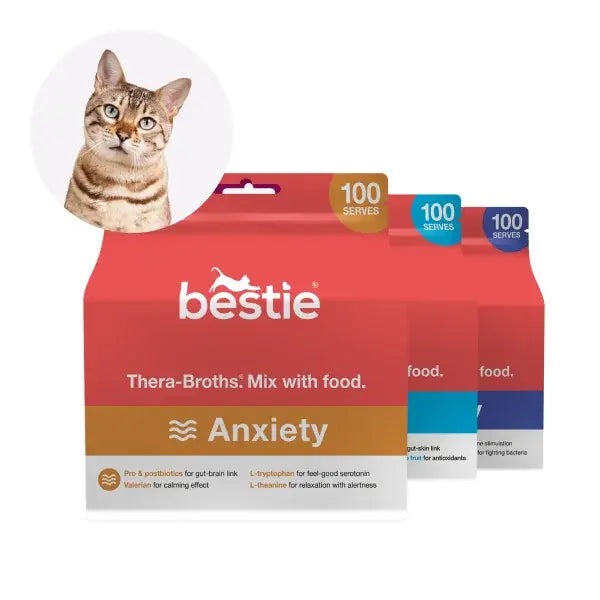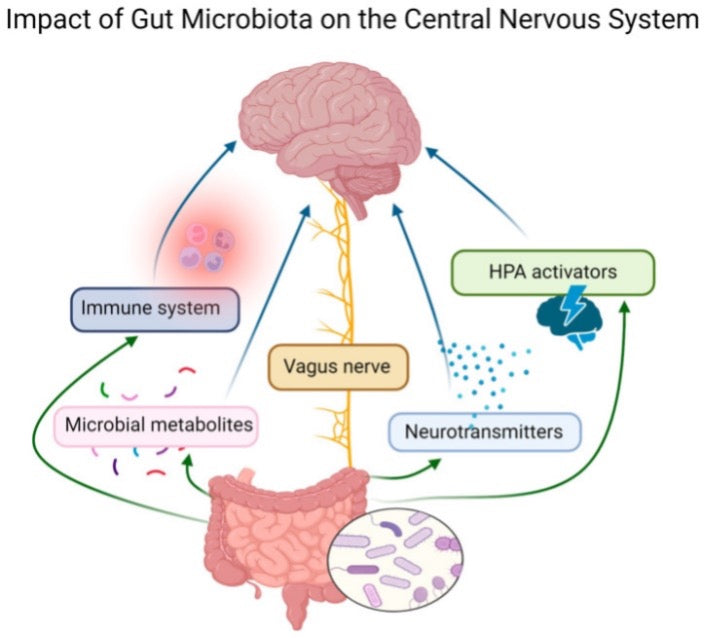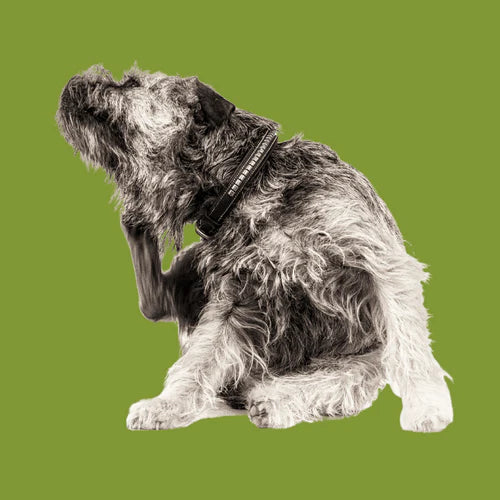In a nutshell:
-
Anxiety is a common concern among dogs generally and disproportionately affecting dogs in rescue shelters.
-
Chronic stress and anxiety are associated with inflammation and gastrointestinal dysfunction.
-
A healthy gut microbiome stimulates the production of bioactive metabolites, neurotransmitters, and gut hormones that communicate with the cognitive centres of the brain.
-
Probiotic strains longumand L. rhamnosushave been proven to reduce anxious behaviour in dogs.
-
The Om probiotic & nutraceutical health chew provides a multimodal approach to help support your dog’s anxiety and stress.
Behaviour issues are one of the main reasons dogs are surrendered to shelters each year(Eagan et al., 2022). Taking a closer look, nearly 70 % of abandoned dogs (and 29% of all dogs) have some form of anxiety(Béata et al., 2007). While anxiety can make life difficult for pets and their guardians, it doesn’t have to be this way.
Emerging studies in humans and dogs emphasise diet’s role in anxiety-like behaviour. Specifically, the data suggests we can reduce anxiety by modifying the diet and incorporating key ingredients to support anxiety.
So, let’s talk about anxiety in dogs and show you how you can support your dog.
How to tell when your dog is anxious
Anxiety isn’t exclusive to humans. Your dog can be anxious too!
Dogs that are hypervigilant and hyperactive are considered to be “anxious”. These dogs are in a constant state of negative emotional arousal despite the absence of triggers. While breed genetics can make a dog more prone to developing anxious behaviours, early life exposure to stressors during a puppy’s socialisation period is also a significant factor. Many pet guardians are ashamed to admit their dog is facing anxiety, however, pets often develop anxious behaviour patterns even before they are united with their new guardians.
Either way, the side effects of anxiety all come down to stress. When your dog is stressed, the brain stimulates the adrenal glands to release cortisol into the bloodstream. Cortisol activates a fight-or-flight response that stimulates energy production, increases heart rate, and changes behaviour—making your pet more anxious.
From a physiological standpoint, exposure to chronic stress and anxiety affects more than just behaviour. When the body is stressed, nearly every organ system is pushed to its limits. Suddenly your anxious dog develops gastrointestinal irritation, suppressed immunity, reactive skin, and impaired reproductive organs.
But, how do you know if your dog is anxious?
Here are some common signs that your pet may be facing general anxiety(McGowan, 2016):
- Unable to settle and excessive wandering
- Excessive barking and attention-seeking habits
- Unnecessary panting when they aren’t hot
- Compulsive licking of objects
- Repeated yawning and body shaking
- Frequent episodes of aggression
- Inappropriate urination and soiling in the house
While anxious behaviour develops early in a dog’s life, as pet guardians, we are in a position to help provide support. Let’s start with your pet’s diet and keep things simple.
Impact of diet on your dog’s brain and behaviour
The classic approach to managing anxiety in dogs is through behaviour modifications and pharmaceuticals. Although these methods show some success, they present a narrow scope of wellness that fails to consider the body as a functional unit with many moving parts.
Anxiety can also be addressed by working with the body and restoring balance naturally through diet. The gut-brain axis provides a constant communication loop between the brain, digestive system, and gut microbiota.
With extensively processed diets (like most kibble) that rely on Maillard reaction byproducts for palatability, the gut tends to enter a state of dysbiosis that makes them susceptible to inflammation. Not to mention, chronic stress is associated with inflammation and gastrointestinal dysfunction (Bharwani et al., 2017). We’ve talked about this in-depth here.
A healthy gut microbiota relies on dietary fibres, fats, and proteins to thrive. In return, these microbes stimulate the production of bioactive metabolites, neurotransmitters, and gut hormones that enter circulation and communicate with the central nervous system.
However, these circulating metabolites are only part of the story as the gut microbiota also communicates directly to the brain by stimulating the vagus nerve. Although the exact mechanism of synthesis is unknown, studies have confirmed that gut microbes can produce neurotransmitters like GABA, norepinephrine, dopamine, and serotonin(Berding et al., 2021). These neurotransmitters are major targets for pharmaceuticals to reduce anxiety and behavioural disorders.
While your dog’s health depends on a balanced gut microbiome, recent studies highlight specific microbial probiotic strains that support anxious behaviours in dogs through dietary supplementation(Bharwani et al., 2017).
Which probiotics support anxiety in dogs?
Probiotics are a group of bacteria with proven benefits when consumed by the host, but not every probiotic strain is equal and capable of performing the same functions. For instance, the probiotic strain Lactobacillus paracaseihas a role in maintaining healthy skin, helping prevent conditions like allergic and atopic dermatitis.
Since we’re focusing on easing your dog’s anxiety, let’s focus on which probiotic strains and nutraceuticals support anxious behaviour.
Bifidobacterium longum (B. longum)
longumis a probiotic strain capable of transiting past the stomach, adhering to the intestines, and colonising the gut where it can benefit dogs (Sabbioni et al., 2016). In particular, studies have shown that B. longum has an anxiolytic effect that functions through noninflammatory mechanisms that involve stimulation of the vagus nerve (Bercik et al., 2011).
This nerve makes up a significant component of the autonomic nervous system and counters the “fight-or-flight” response brought on by stress to provide relaxation to the body. Nearly 90% of vagus nerve fibres are responsible for sending information from the gut to the brain, and stimulation of these fibres provide a promising solution to treatment-resistant anxiety disorders(Breit et al., 2018).
The B. longum probiotic strain has also caught the attention of Purina, urging them to investigate the anti-anxiety effects of this organism. By supplementing 12 dogs with B. longum for 6 weeks, they found a decrease in anxiety from both a behavioural and physiological perspective. Treatment led to decreased barking, jumping, spinning, and pacing—all signs of anxious behaviour. In addition, B. longumdecreased salivary cortisol levels and heart rate in response to anxiety-inducing stimuli like being startled, separation, and introduction to strangers(McGowan, 2016).

Similar to B. longum, other probiotic strains like Lactobacillus rhamnosus have also been shown to utilise the vagus nerve to communicate with the cognitive centres of the brain and reduce anxiety-related behaviour.
Lactobacillus rhamnosus (L. rhamnosus)
One of the most studied probiotic strains in humans is L. rhamnosus, and recent studies have shown this strain is also effective in dogs. First, L. rhamnosushas been shown to colonise the gut and produce antimicrobial substances against pathogenic bacteria like E. coli, Salmonella, Clostridium, Streptococcus,and Bacteroides(Bharwani et al., 2017). This antimicrobial activity helps prevent chronic stress and dysbiosis of the digestive system, preventing anxious behaviour in humans and pets(Weese & Anderson, 2002).
Further, a meta-analysis performed at the University of Kansas collected data from 22 preclinical studies (743 animals) and 14 clinical studies (1527 individuals) to understand the anxiolytic effect of probiotics. From the numerous probiotic strains tested, the researchers found L. rhamnosusto be an anxiolytic species in animals, but not humans. They also found that when combined, L. rhamnosusand B. longum work together to provide relief from anxiety(Reis et al., 2018).
Considering that stress directly affects the composition of the gut microbiome, researchers analysed the feces of stress-exposed mice and found that 70 of 621 metabolites were significantly altered. When L. rhamnosus was supplemented to stressed mice, the mice became less avoidant to social stimuli and were more eager to explore their surroundings—both signs of decreased anxiety. Many of these affected metabolites are also involved in tryptophan metabolism, an essential amino acid associated with mood, anxiety, and behaviour(Bharwani et al., 2017).
Nutraceuticals that support anxiety in dogs
Nutraceuticals are dietary components naturally found in foods that have been shown to provide health benefits(Souyoul et al., 2018). We’ve combined probiotics like L. rhamnosusand B. longum with specific nutraceuticals that help support anxious behaviour in dogs.
For example, L-tryptophan is an essential amino acid that is a precursor for serotonin, a neurotransmitter directly involved in mood and anxious behaviour. Since the synthesis of serotonin depends on the availability of tryptophan, low serum levels of tryptophan have been associated with behavioural disorders in dogs(Riggio et al., 2020).
Similarly, L-theanine is another amino acid found in some teas and mushrooms that have been shown to provide anxiety relief to dogs. When supplemented for 1-2 months, L-theanine had a relaxation effect in dogs with a fear of humans and storms(Dramard et al., 2018).
Nutritional yeast is another nutraceutical that can also support anxiety because it is a source of B vitamins. Studies in humans have shown that a higher dietary intake of B vitamins reduces the risk of anxiety, depression, and stress(Mahdavifar et al., 2021).
Together with herbs and fruits like valerian, linden, hawthorn, and pomegranate that support relaxation, we’ve developed a nutraceutical health chew that uses a multimodal approach to help relieve your dog of anxiety.
We’ve called this blend The Om. A probiotic & nutraceutical health chew that can help dogs overcome anxiety and make their home a safe space. Learn more here!
Ash Sadri

Ash is a Canadian veterinary student studying in Croatia. Before deciding to become a vet, Ash completed his Masters degree at the University Of Western Ontario where he specialized in cancer stem cells research. Since then, he’s been working as a veterinary technician and has special interests in animal nutrition and surgical procedures!
Sources:
Bercik, P., Park, A. J., Sinclair, D., Khoshdel, A., Lu, J., Huang, X., . . . Verdu, E. F. (2011). The anxiolytic effect of Bifidobacterium longum NCC3001 involves vagal pathways for gut-brain communication. Neurogastroenterol Motil, 23(12), 1132-1139. https://doi.org/10.1111/j.1365-2982.2011.01796.x
Berding, K., Vlckova, K., Marx, W., Schellekens, H., Stanton, C., Clarke, G., . . . Cryan, J. F. (2021). Diet and the Microbiota-Gut-Brain Axis: Sowing the Seeds of Good Mental Health. Adv Nutr, 12(4), 1239-1285. https://doi.org/10.1093/advances/nmaa181
Bharwani, A., Mian, M. F., Surette, M. G., Bienenstock, J., & Forsythe, P. (2017). Oral treatment with Lactobacillus rhamnosus attenuates behavioural deficits and immune changes in chronic social stress. BMC Med, 15(1), 7. https://doi.org/10.1186/s12916-016-0771-7
Breit, S., Kupferberg, A., Rogler, G., & Hasler, G. (2018). Vagus Nerve as Modulator of the Brain-Gut Axis in Psychiatric and Inflammatory Disorders. Front Psychiatry, 9, 44. https://doi.org/10.3389/fpsyt.2018.00044
Béata, C., Beaumont-Graff, E., Diaz, C., Marion, M., Massal, N., Marlois, N., . . . Lefranc, C. (2007). Effects of alpha-casozepine (Zylkene) versus selegiline hydrochloride (Selgian, Anipryl) on anxiety disorders in dogs. Journal of Veterinary Behavior-clinical Applications and Research, 2, 175-183.
Dramard, V., Kern, L., Hofmans, J., Rème, C. A., Nicolas, C. S., Chala, V., & Navarro, C. (2018). Effect of l-theanine tablets in reducing stress-related emotional signs in cats: an open-label field study. Ir Vet J, 71, 21. https://doi.org/10.1186/s13620-018-0130-4
Eagan, B. H., Gordon, E., & Protopopova, A. (2022). Reasons for Guardian-Relinquishment of Dogs to Shelters: Animal and Regional Predictors in British Columbia, Canada. Front Vet Sci, 9, 857634. https://doi.org/10.3389/fvets.2022.857634
Mahdavifar, B., Hosseinzadeh, M., Salehi-Abargouei, A., Mirzaei, M., & Vafa, M. (2021). Dietary intake of B vitamins and their association with depression, anxiety, and stress symptoms: A cross-sectional, population-based survey. J Affect Disord, 288, 92-98. https://doi.org/10.1016/j.jad.2021.03.055
McGowan, R. (2016). ‘Oiling the Brain’ or ‘Cultivating the Gut’: Impact of Dieton Anxious Behavior in Dogs. Nestlé Purina Research.
Reis, D. J., Ilardi, S. S., & Punt, S. E. W. (2018). The anxiolytic effect of probiotics: A systematic review and meta-analysis of the clinical and preclinical literature. PLoS One, 13(6), e0199041. https://doi.org/10.1371/journal.pone.0199041
Riggio, G., Mariti, C., Sergi, V., Diverio, S., & Gazzano, A. (2020). Serotonin and Tryptophan Serum Concentrations in Shelter Dogs Showing Different Behavioural Responses to a Potentially Stressful Procedure. Vet Sci, 8(1). https://doi.org/10.3390/vetsci8010001
Sabbioni, A., Ferrario, C., Milani, C., Mancabelli, L., Riccardi, E., Di Ianni, F., . . . Ossiprandi, M. C. (2016). Modulation of the Bifidobacterial Communities of the Dog Microbiota by Zeolite. Front Microbiol, 7, 1491. https://doi.org/10.3389/fmicb.2016.01491
Souyoul, S. A., Saussy, K. P., & Lupo, M. P. (2018). Nutraceuticals: A Review. Dermatol Ther (Heidelb), 8(1), 5-16. https://doi.org/10.1007/s13555-018-0221-x
Weese, J. S., & Anderson, M. E. (2002). Preliminary evaluation of Lactobacillus rhamnosus strain GG, a potential probiotic in dogs. Can Vet J, 43(10), 771-774.


